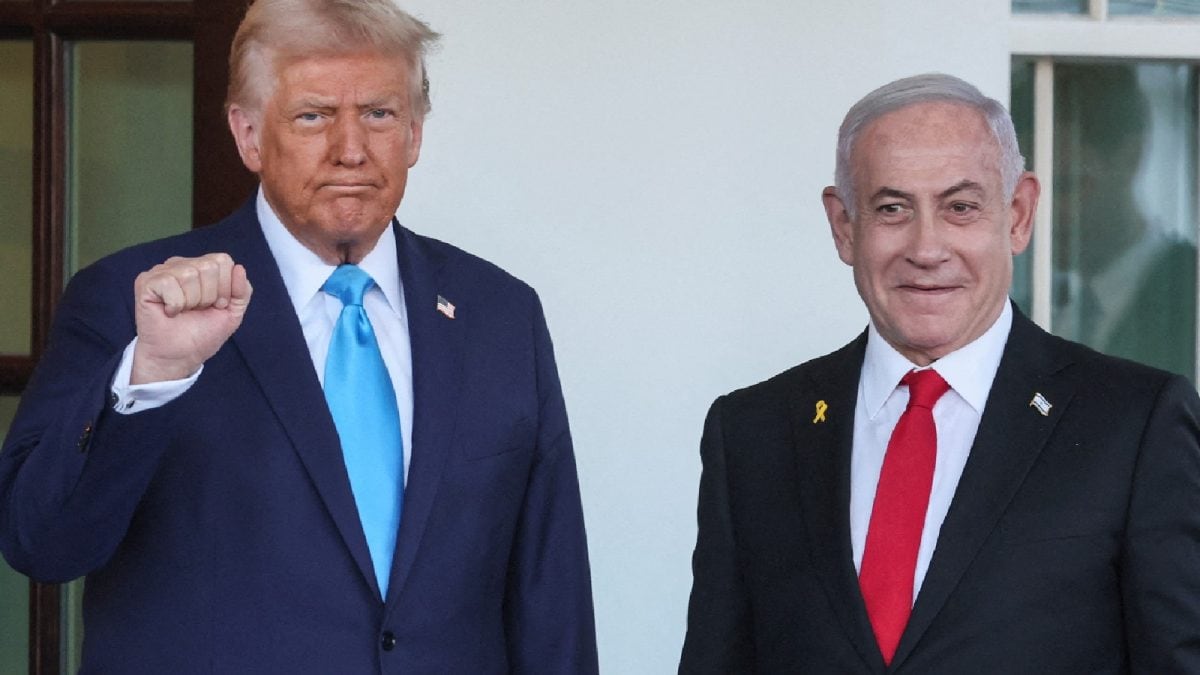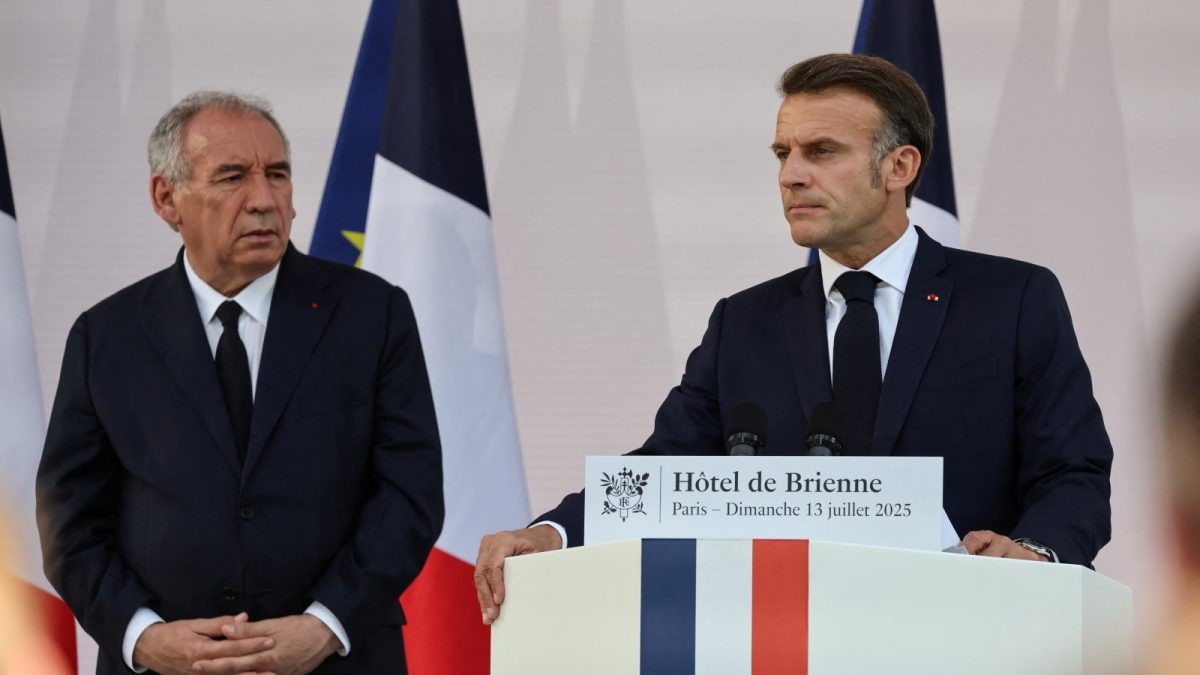Last Updated:
Eight months after returning to the White House with promises to end wars in Gaza and Ukraine, US President Donald Trump finds himself sidelined in both

US President Donald Trump with Israeli Prime Minister Benjamin Netanyahu. (Reuters file photo)
On Tuesday, Israeli fighter jets carried out an airstrike in Qatar’s capital, Doha, targeting senior members of Hamas’ political bureau. According to CNN, the raid killed five Hamas members, but missed the key negotiators US President Donald Trump had hoped would soon agree to a US-backed ceasefire plan. What made the strike even more explosive diplomatically was that it was conducted on the soil of Qatar, a long-time US ally, host of the Al Udeid Air Base (the largest American military facility in the Middle East), and a key intermediary in the Gaza peace talks.
While the Israeli government confirmed it had launched the operation unilaterally, Trump’s administration was not alerted in advance. Trump later expressed dissatisfaction with how events unfolded and assured Qatari leaders that such an incident would not be repeated. But diplomatic damage had already occurred between Trump and Israeli Prime Minister Benjamin Netanyahu, and more broadly, between the US and its Gulf partners.
Recommended Stories
What Happened In Qatar And Why Was Trump Blindsided?
The Israeli airstrike hit a residential district in Doha early Tuesday, targeting buildings housing Hamas operatives, including members of its political bureau. Qatar’s foreign ministry confirmed the buildings were being used by negotiators involved in ongoing ceasefire discussions, talks that had been facilitated by the US and Qatar for nearly two years.
According to CNN, Trump was informed about the incoming Israeli strike not by Netanyahu or the Israeli government, but by General Dan Caine, Chairman of the Joint Chiefs of Staff. He then directed his special envoy, Steve Witkoff, to notify the Qatari government. However, by the time Witkoff made contact, the bombs were already falling.
Qatar’s Prime Minister, Sheikh Mohammed bin Abdulrahman Al Thani, later said the first call from the US came ten minutes after the strike had begun. The timeline sharply contradicted Trump’s Truth Social post, where he claimed Witkoff had been instructed to inform Qatar “immediately.” The incident sparked diplomatic fallout and cast uncertainty over ongoing hostage negotiations.
Has The Ceasefire Deal Collapsed Now?
The Doha talks were at a critical juncture. On Sunday, Trump had issued a third and final “warning” to Hamas to accept the latest US-backed ceasefire proposal. According to CNN, the Hamas negotiators targeted in the strike were believed to be in the middle of reviewing that deal. By striking them during this process, Netanyahu may have disrupted the most active diplomatic channel available.
Qatar, despite hosting Hamas leaders and facing criticism for it, had been the primary conduit for backchannel diplomacy, including hostage exchanges and aid deliveries. On Tuesday, Al Thani said bluntly, as quoted by The Guardian, “For current talks, I do not think there’s something valid right now after what we saw from today’s attack.”
Experts echoed the same concern. Steven Cook of the Council on Foreign Relations, speaking to CNN, said that Doha had “exerted considerable effort” to release Israeli hostages, only to be repaid with an airstrike.
Is Netanyahu Deliberately Undermining Trump’s Peace Roadmap?
This was not the first time the Israeli Prime Minister has launched major military operations without prior consultation with Washington. In June, Israel launched a surprise 12-day offensive on Iran with minimal notice, jeopardising Trump’s separate attempt to restart nuclear talks with Tehran. Earlier this summer, Trump also reportedly expressed frustration after Israeli forces struck a Catholic church inside Gaza, and later bombed targets in Damascus without prior consultation.
A similar pattern was evident this week. On Monday, just one day before the Qatar strike, Netanyahu’s senior adviser Ron Dermer met with Trump’s envoy Steve Witkoff. Yet Dermer said nothing about the upcoming attack. As one US official told CNN, this has further inflamed tensions within the White House, where aides were reportedly “angry and blindsided.”
Still, Netanyahu has stood firm. On Tuesday, he said: “The days when the heads of terror enjoyed immunity anywhere are over.” Referring to the Hamas officials targeted in Doha, he added: “These are the same terrorists who planned and celebrated the massacres of October 7.”
How Has Trump Responded And Why Is His Credibility At Stake?
In a carefully worded Truth Social post, Trump wrote: “This was a decision made by Prime Minister Netanyahu, it was not a decision made by me.” He called the location of the strike “very unfortunate,” but reiterated that “eliminating Hamas is a worthy goal.” This contradictory stance, criticising the strike but praising its objective, has drawn criticism and scrutiny.
Speaking to reporters that evening, he said: “I was very unhappy about it, very unhappy about every aspect, and we got to get the hostages back. But I was very unhappy about the way that went down.” Behind the scenes, Trump’s aides scrambled to control the fallout, trying to reassure Qatar while avoiding a public rupture with Israel.
But the damage is deeper than diplomacy. Trump had personally invested in the Qatar track, visiting Doha in May and accepting a Boeing 747 luxury jet from the Qatari government to serve as the new Air Force One, a move that critics say blurred ethical lines. Now, that relationship faces renewed strain.
Could This derail Trump’s ‘Abraham Accords 2.0’ Vision?
Trump had hoped to build on the Abraham Accords — normalising ties between Israel and Gulf states — and even floated the idea of being nominated for a Nobel Peace Prize if he could deliver both a Gaza truce and a broader regional peace deal that includes Saudi Arabia and possibly Qatar.
However, with Qatar’s leadership publicly denouncing the Israeli strike as an act of “treachery,” and with mediation efforts paused indefinitely, the future of those plans has come under question. As CNN noted, some Gulf states may now question the reliability of US security guarantees, particularly when a close American ally like Qatar can be targeted without warning.
Adding to the complications, the UN Security Council has now been convened at Algeria’s request, and international pressure on Israel is once again mounting.
Where Does This Leave The Hostages And The Gaza War?
With its relationship with both Hamas and the United States, Doha has been the key link in several previous exchanges and ceasefire proposals. The strike has now cast a shadow over that channel.
While Egypt remains another potential mediator, Steven Cook told Guardian that it is a “thankless task” when neither Hamas nor Israel appears interested in compromise.
Meanwhile, the humanitarian situation in Gaza continues to deteriorate. The Israeli military has issued a full evacuation order for Gaza City, where hundreds of thousands of displaced people have sought shelter. Aid groups warn of severe shortages of food, water, and medicine, and Trump’s promise to “end the war” in weeks now appears hollow.
What’s Next For Trump’s Middle East Strategy?
The fallout from the Doha strike has raised serious questions about Trump’s ability to influence Israel’s conduct. According to The NYT, some analysts believe that Netanyahu is operating with minimal concern for US preferences, while others suspect that Israel may have offered Trump plausible deniability.
John E. Herbst, senior director at the Atlantic Council, told NYT: “Trump is in a ‘Bibi, do what you want’ phase — which is not necessarily where he’ll be tomorrow.”
For now, the White House continues to walk a tightrope, supporting Israel, preserving Qatar ties, and still hoping for a ceasefire. But the illusion of being the only leader capable of delivering peace, a central theme of Trump’s second-term foreign policy, is beginning to unravel.
And with each new unilateral Israeli strike, it becomes clearer that in the Gaza conflict, Trump may be a spectator, not the conductor he claims to be.
About the Author

Karishma Jain, Chief Sub Editor at News18.com, writes and edits opinion pieces on a variety of subjects, including Indian politics and policy, culture and the arts, technology and social change. Follow her @kar…Read More
Karishma Jain, Chief Sub Editor at News18.com, writes and edits opinion pieces on a variety of subjects, including Indian politics and policy, culture and the arts, technology and social change. Follow her @kar… Read More
September 10, 2025, 14:29 IST
Loading comments…
Read More




